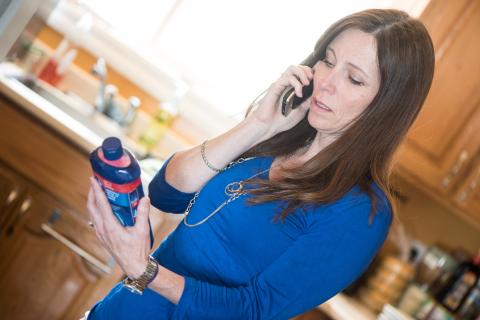Every year, the poison specialists at the Atlantic Canada Poison Centre receive calls from people who had a mishap with household products that create toxic fumes—some resulting in serious injuries.
We asked Poison Centre staff to share with us some common scenarios that they encounter, where people have had to call their local Poison Centre for medical advice:
Carbon Monoxide: The Silent Killer
- Scenario 1: Person called with a severe headache and feeling "slow" after having a generator running outside her home. Stated that generator was positioned by basement window which was opened to let the cords come in.
- Scenario 2: Person called with dizziness, vomiting and severe headache after running wood furnace. It was not working properly and created a lot of smoke in the house.
- Scenario 3: Person feeling nauseous, dizzy and light-headed after using a charcoal grill on an exterior porch on the home.
Every year in Canada, more than 300 people die and 200 more are hospitalized from carbon monoxide poisoning. We call Carbon Monoxide the “Silent Killer” because you can’t see it, taste it or even smell it. In fact, the only way to detect it at all is by using carbon monoxide alarms in your home.
The people in these scenarios were all fortunate that they realized something was wrong before it was too late. They got themselves to fresh air, and called the Poison Centre for advice immediately. With enough time, continued exposure to carbon monoxide can lead to unconsciousness and eventually, death.
You can reduce the risk of this happening in your home by following these guidelines:
- Be familiar with all fuel-burning appliances in your home and their potential risks. This includes: gas/oil/wood furnace, gas/propane water heater, gas/propane dryer, Gas/propane/charcoal barbeque, gas/propane stove, car, gas/propane/wood burning fireplace, portable fuel generator.
- If you have a fuel-burning appliance, have a carbon monoxide alarm on every level of your home, and make sure you test it every year to ensure it is working.
- Be familiar with the symptoms of CO poisoning: these can include headache, dizziness, weakness, nausea, vomiting, chest pain and confusion. If these symptoms strike several people in the household at once, assume that there are CO fumes and go outside to fresh air immediately. Call the Poison Centre or 911.
- Have all fuel-burning appliances and chimneys inspected every year to make sure they are functioning safely with no blockages.
- Never leave your car running while it is inside the garage. Make sure the exhaust pipe is always clear of blockages (e.g. snow).
- Only use generators, barbeques and camp stoves outdoors and well away from windows and doors, and covered porches.
Mixing Cleaning Products
- Scenario 1: Person opened powder chlorine in a bucket in his basement to put into a hot tub and the house was overcome with fumes. He stated that his eyes and throat were burning.
- Scenario 2: Person can’t stop coughing after cleaning up cat urine (ammonia) with Fantastic spray (containing bleach).
- Scenario 3: Person mixed vinegar and chlorine together in his pressure washer in efforts to eliminate mold. He used the mixture for about 10 minutes before feeling really sick and developing a cough and wheeze in his upper airway.
Many people don’t realize that mixing certain common household cleaners together can create poisonous gases that can make you sick. For example:
- Liquid bleach + ammonia = Chloramine Gas
- Liquid bleach + vinegar = Chlorine Gas
- Both these gases can cause severe breathing problems and can irritate your eyes and skin.
So how can you reduce the risk of these kinds of poisonings from happening in your home?
- Always follow directions on product labels, and pay close attention to chemical hazard symbols.
- Use household chemicals in a well-ventilated space: open windows/doors or use fans if necessary.
- Always wash your hands after using household chemicals. Wear gloves if possible.
- Store all chemicals in a high/locked place, away from children.
- Store all chemicals in their original containers.
- Store all chemicals in a dry, cool area.
- Save local poison centre, fire & other emergency numbers in your phone contacts for easy access.
- If you think you have been poisoned, call your local poison centre immediately. Trained experts will tell you what you need to do.
- Never ignore symptoms.
For more information resources on this topic, visit our Poison Prevention Week 2023 page here.
The Atlantic Canada Poison Centre is available 24 hours a day, 7 days a week as a confidential source of information on poisons and poison exposures. The staff at the Poison Centre includes nurses and pharmacists, supported by on-call physicians, who are specialists in poison information, including medication and non-medication related inquiries. The Poison Centre provides service for all ages (adults and children). In NS, PEI, NB and NL, call 1-844-POISONX (1-844-764-7669).
